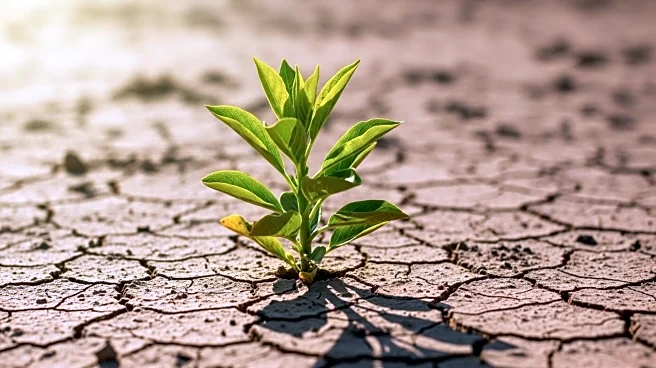What's Happening?
The global food industry is grappling with significant sustainability challenges as climate change impacts key agricultural regions. Crops such as cocoa, coffee, corn, and maize are under threat from extreme weather conditions, including droughts and storms. This has led to financial strains for companies like Nestlé, which are experiencing sales declines as consumers resist price increases. The industry's supply chains are increasingly vulnerable to climate-related disruptions, prompting concerns about long-term viability. Despite the growing need for sustainable practices, skepticism about their short-term economic impact is rising among businesses, policymakers, and consumers. Companies fear that sustainability efforts may reduce competitiveness, while consumers view sustainability as an additional financial burden amid economic uncertainty.
Why It's Important?
The decline in sustainability efforts poses a significant risk to the food industry and global agriculture. Unsustainable practices, such as deforestation, exacerbate climate change by destroying carbon sinks and increasing carbon emissions. This creates a vicious cycle, further intensifying climate-related challenges and reducing viable production areas. For farmers, climate change threatens soil health and crop yields, impacting food supply and prices. Consumers face higher costs as weather disruptions affect global food production. The industry's reluctance to fully embrace sustainability could lead to more frequent and severe climate-related disruptions, affecting businesses, supply chains, and investors. Collaborative efforts are essential to balance competition with sustainability goals, ensuring long-term resilience against climate impacts.
What's Next?
The food industry must navigate the tension between short-term competitiveness and long-term sustainability. Companies may need to collaborate more closely to implement sustainable practices that mitigate climate risks. Policymakers could face pressure to balance economic interests with environmental regulations, potentially leading to new policies that support sustainable agriculture. Consumers may demand more transparency and accountability from companies regarding their sustainability commitments. As climate change continues to impact global agriculture, the industry will need to adapt to ensure food security and economic stability. Ongoing dialogue and cooperation among stakeholders will be crucial to drive meaningful progress in sustainability.
Beyond the Headlines
The sustainability debate in the food industry highlights broader ethical and environmental considerations. The industry's response to climate change could influence global efforts to address environmental challenges. Sustainable practices not only protect natural resources but also promote social responsibility by ensuring fair labor practices and protecting indigenous rights. The industry's actions could set a precedent for other sectors, emphasizing the importance of integrating sustainability into business models. As climate change remains a pressing global issue, the food industry's approach to sustainability could have far-reaching implications for environmental policy and corporate responsibility.









